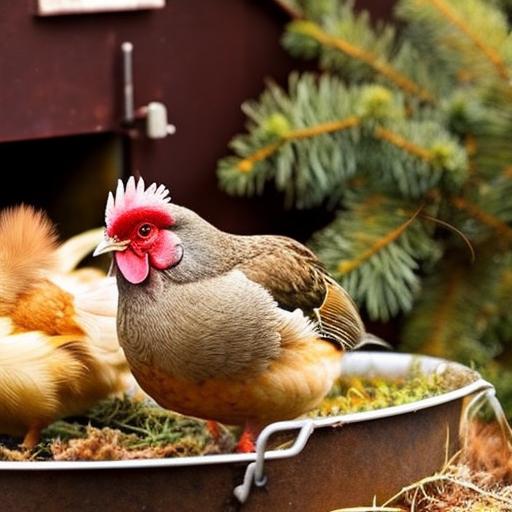Keeping chickens warm in winter is an important aspect of caring for these feathered friends. As the temperature drops, it becomes crucial to provide them with a cozy and comfortable environment to ensure their well-being. Neglecting to keep your chickens warm during the colder months can lead to various health issues and even death. In this article, we will discuss the importance of keeping chickens warm in winter and provide tips on how to do so effectively.
Key Takeaways
- Keeping chickens warm in winter is crucial for their health and well-being.
- Preparing the chicken coop for winter involves insulation, bedding, and a water heater.
- Insulation is a must for the chicken coop to keep the temperature stable.
- A heated chicken coop may not be necessary if proper insulation and bedding are in place.
- Feeding and providing additional care for chickens during winter will ensure their happiness and health.
Understanding the Importance of Keeping Your Chickens Warm in Winter
Chickens are susceptible to cold temperatures, just like any other living creature. When exposed to extreme cold, they can suffer from frostbite, respiratory problems, and even hypothermia. It is essential to keep your chickens warm to prevent these issues and maintain their overall health.
Frostbite is a common problem in chickens during winter. Their combs, wattles, and feet are particularly vulnerable to frostbite due to their lack of insulation. If left untreated, frostbite can lead to tissue damage and infection. Respiratory problems are also a concern as chickens tend to huddle together in confined spaces during winter, increasing the risk of spreading diseases. Additionally, chickens can experience hypothermia if they are unable to regulate their body temperature properly.
Preparing the Chicken Coop for Winter
Preparing the chicken coop for winter is crucial in ensuring your chickens’ warmth and comfort. Start by inspecting the coop for any cracks or gaps that may let cold air in. Seal these openings with caulk or weatherstripping to prevent drafts. It is also essential to ensure proper ventilation in the coop to prevent moisture buildup, which can lead to respiratory issues.
Another important step is cleaning the coop thoroughly before winter arrives. Remove any debris or droppings that may harbor bacteria or pests. A clean coop provides a healthier environment for your chickens during the colder months.
Insulation: A Must for the Chicken Coop
Insulating the chicken coop is vital for maintaining a warm and cozy environment for your chickens. Insulation helps retain heat and prevents drafts from entering the coop. There are various types of insulation you can use, such as fiberglass batts, foam boards, or reflective insulation.
Fiberglass batts are a popular choice for insulating chicken coops. They are easy to install and provide excellent thermal insulation. Foam boards, on the other hand, offer superior insulation and are resistant to moisture. Reflective insulation is another option that reflects heat back into the coop, keeping it warm.
Heated Chicken Coop: Is it Necessary?
The decision to have a heated chicken coop depends on various factors, including the climate in your area and the number of chickens you have. In mild winter climates, a heated coop may not be necessary as long as proper insulation and bedding are provided. However, in extremely cold regions, a heated coop can be beneficial in ensuring your chickens’ comfort and well-being.
There are pros and cons to having a heated chicken coop. The main advantage is that it provides a consistent and comfortable temperature for your chickens, reducing the risk of frostbite and other cold-related issues. However, a heated coop can also increase the risk of fire if not installed and monitored properly. It is essential to follow safety guidelines and use appropriate heating methods if you choose to have a heated coop.
Bedding: The Secret to Keeping Your Chickens Warm

Bedding plays a crucial role in keeping chickens warm during winter. It provides insulation and helps regulate moisture levels in the coop. There are several types of bedding you can use, including straw, wood shavings, or shredded paper.
Straw is a popular choice for chicken bedding as it provides excellent insulation and absorbs moisture effectively. Wood shavings are another option that provides good insulation and helps control odors. Shredded paper can also be used as bedding, but it may not provide as much insulation as straw or wood shavings.
Water Heater: Ensuring Your Chickens Stay Hydrated
Ensuring your chickens stay hydrated during winter is essential for their overall health. However, water can freeze quickly in cold temperatures, making it inaccessible to your chickens. Using a water heater can help prevent this issue and ensure a constant supply of unfrozen water.
There are different types of water heaters available, such as heated waterers or heated bases. Heated waterers have built-in heating elements that keep the water from freezing. Heated bases, on the other hand, are placed under regular waterers to prevent freezing. Whichever option you choose, make sure to follow the manufacturer’s instructions and regularly check the water supply to ensure it is not frozen.
Feeding Your Chickens During Winter
Feeding your chickens a balanced diet is crucial during winter to support their immune system and maintain their body temperature. Provide them with high-quality feed that is specifically formulated for laying hens. This feed should contain essential nutrients such as protein, vitamins, and minerals.
In addition to their regular feed, you can also supplement their diet with scratch grains or kitchen scraps. These treats provide extra calories and help keep your chickens warm by increasing their metabolism. However, it is important not to overfeed them, as obesity can lead to health issues.
Additional Tips for Keeping Your Chickens Warm
Here are some additional tips for keeping your chickens warm in winter:
1. Provide extra light: As the days get shorter, providing extra light in the coop can help stimulate egg production and keep your chickens active.
2. Keep the coop clean: Regularly clean the coop to prevent the buildup of droppings and moisture, which can lead to respiratory issues.
3. Use heat lamps cautiously: If you choose to use heat lamps, make sure to secure them properly and keep them away from flammable materials. Monitor them regularly to prevent accidents.
4. Provide windbreaks: If your coop is exposed to strong winds, consider installing windbreaks or using tarps to protect your chickens from drafts.
Happy and Healthy Chickens in Winter
Keeping your chickens warm in winter is essential for their well-being and overall health. By preparing the chicken coop, insulating it properly, providing bedding, ensuring access to unfrozen water, and feeding them a balanced diet, you can ensure that your chickens stay warm and comfortable during the colder months. Remember to follow safety guidelines when using heating methods and regularly monitor your chickens’ health. With proper care and attention, you can have happy and healthy chickens throughout the winter season.
If you’re looking for the best way to keep your chickens warm in the winter, you’ll definitely want to check out this informative article on Poultry Wizard. They have a range of helpful articles on chicken care, and one that caught my attention is about how big a coop needs to be for a chicken. It’s important to provide your feathered friends with enough space to move around comfortably, especially during the colder months. So, if you’re interested in learning more about creating a cozy and spacious environment for your chickens, be sure to click on this link: https://poultrywizard.com/keeping-chickens/how-big-does-a-coop-need-to-be-for-a-chicken/.
FAQs
What temperature range is safe for chickens in the winter?
Chickens can tolerate temperatures as low as 20°F, but it is recommended to keep their coop between 32°F and 50°F to ensure their comfort and health.
What are some ways to insulate a chicken coop?
Insulating a chicken coop can be done by using materials such as straw bales, bubble wrap, or foam boards. It is important to ensure proper ventilation while insulating to prevent moisture buildup.
What type of bedding is best for keeping chickens warm?
Bedding materials such as straw, hay, or wood shavings can provide insulation and warmth for chickens. It is important to keep the bedding dry and clean to prevent mold and bacteria growth.
Should I use a heat lamp to keep my chickens warm?
While heat lamps can provide warmth, they can also be a fire hazard and cause injury to chickens. It is recommended to use safer alternatives such as heated pads or panels.
How can I prevent frostbite in my chickens during the winter?
To prevent frostbite, ensure that the coop is well-insulated and free of drafts. Provide roosts for chickens to perch on and keep their feet off the cold ground. Applying petroleum jelly to their combs and wattles can also help prevent frostbite.
Meet Walter, the feathered-friend fanatic of Florida! Nestled in the sunshine state, Walter struts through life with his feathered companions, clucking his way to happiness. With a coop that’s fancier than a five-star hotel, he’s the Don Juan of the chicken world. When he’s not teaching his hens to do the cha-cha, you’ll find him in a heated debate with his prized rooster, Sir Clucks-a-Lot. Walter’s poultry passion is no yolk; he’s the sunny-side-up guy you never knew you needed in your flock of friends!







